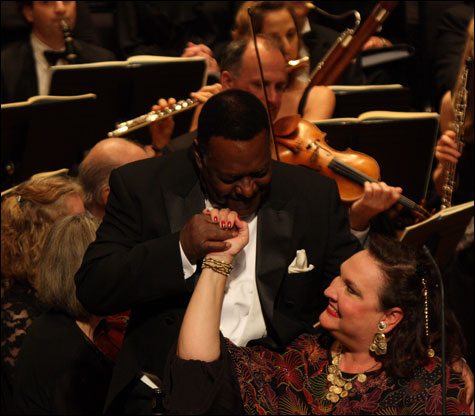The Cantata Singers’ Weill retrospective, Mark Morris leading Dido , Chorus pro Musica’s Carmen
By LLOYD SCHWARTZ | June 3, 2008

CARMEN Robert Honeysucker, here with Victoria Livengood, made Escamillo’s “Toreador Song”
the song of seduction that Bizet intended. |
Most people probably think of the Cantata Singers as specializing in early choral music, especially Bach, forgetting how much 20th-century and contemporary music director David Hoose has focused on. This season’s “Unveiling Weill” spotlit Kurt Weill, the concerts ranging from Boston premieres of rarely heard works (like the 1929 radio cantata Der Lindberghflug — ”The Lindbergh Flight” — and Die Propheten, an extended section of Weill’s ambitious Biblical epic Der Weg der Verheißung|The Eternal Road) to delicious performances of his most famous songs, some preceding the official program or following intermission. At the final concert last month, soprano Megan Beltran’s poignant rendering of “Fennimore’s Song” — about the humiliation of being a poor relation, from Der Silbersee|The Silver Sea (1932-’33) — made me want to hear the entire opera. The major Weill on that program was the scintillating, characterful Symphony No. 2 (1934). Hoose called it “as close to unfettered joy as Weill can get,” a surprising description of this nervy, restless piece with its echoes of Silbersee, dourly lamenting funeral march, and ominous undercurrent of drumming, though also with a gorgeously overflowing love theme (introduced here by oboist Peggy Pearson). Is the ending festive or desperate?All season, Hoose paired Weill with composers he evolved from, offered alternatives to, or stimulated: Brahms, Schoenberg, Dallapiccola, Busoni, Orff. We got the world premiere of Lior Navok’s Slavery Documents 3: And the Trains Kept Coming . . . (a Cantata Singers commission, dealing with the Holocaust), and, on the final program, the Boston premiere of Charles Fussell’s High Bridge — A Choral Symphony After Poems by Hart Crane — four extended sections of “The Bridge” plus the visionary “Atlantis,” which Fussell added after the first performance in 2003.
Fussell’s score has an old-fashioned romantic fervor and welcoming tonality — a knowing counterpart to Crane’s intensely rhetorical musicality. “The Harbor Dawn” begins with quiet chiming and then a wash of sound; two lovers are in bed (soprano Karyl Ryczek and tenor William Hite, though surely Crane’s bedmate was a sailor he’d picked up). “Cutty Sark” is an edgier, extroverted folk comedy of tall tales (delivered with gusto by baritone David Kravitz) that turns into something more mysterious and ends with the chorus humming and the words disappearing into the horizon. An extended orchestral “portrait” of Crane is the heart of the piece, but my favorite section was probably the haunting “Indiana,” given mezzo-soprano Janna Baty’s amplitude and luscious vocalism and the glistening pointillism of vibraphone, harp, and celesta. High Bridge now has two endings: “Virginia” — chimes, gong, drum rolls — is a big-finish Scherzo but not the full resolution that “Atlantis,” with its ecstatic repetitions and eerie final diminuendo, represents. I can’t imagine a performance more committed or powerful.
 Related
Related:
Year in Classical: Celebrate!, Love and loss, Singers’ delight, More 
- Year in Classical: Celebrate!
In Handel's Hercules, the demented Dejanira's loss is still so painful, I was afraid to listen; now I don't want to hear anything else.
- Love and loss
Boston’s biggest classical-music story this year was also its saddest.
- Singers’ delight
The season may be starting to wind down, but there remain some events music lovers have been waiting for all year.
- All over again
The Boston Symphony Orchestra program for last week’s four concerts was a familiar one.
- Unembarrassed riches
Some weeks Boston has such musical riches, one wouldn’t want to be anywhere else.
- Flying high
Cantata Singers director David Hoose must feel that Weill’s music is more timely than ever.
- Double or nothing
The American premiere of Dido took place here in Boston, at the Majestic Theatre in June 1989.
- Boston music news: January 12, 2007
Rock and pharmaceuticals may have a long history, but what about rock and pharmacies?
- L’Allegro, fuss and feathers, and the ICA blues
This year we were looking forward to dance performances at the Barbara Lee Family Foundation Theater in the new ICA.
- Demon daze
Hart Crane roared through his short, tormented, and doomed life.
- Altar and ego
Mark Morris’s Dido and Aeneas
- Less

 Topics
Topics:
Classical
, David Kravitz, Entertainment, Charles Fussell, More  , David Kravitz, Entertainment, Charles Fussell, Hart Crane, Robert Honeysucker, Karyl Ryczek, Janna Baty, James Maddalena, Martha Moor, Bradon McDonald, Less
, David Kravitz, Entertainment, Charles Fussell, Hart Crane, Robert Honeysucker, Karyl Ryczek, Janna Baty, James Maddalena, Martha Moor, Bradon McDonald, Less 